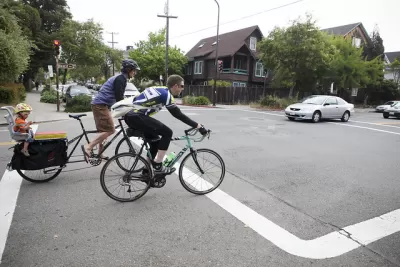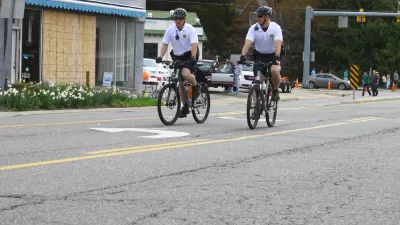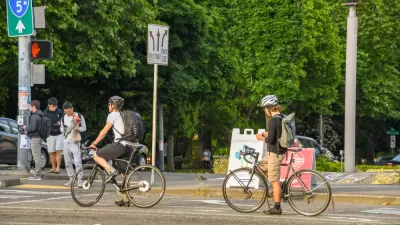Berkeley could decide to deprioritize enforcement of people on bikes who treat stop signs as yield signs when the intersection is free of traffic.

The Berkeley City Council recently "voted to explore potential changes to local bicycle traffic laws, most notably moving the city toward an 'Idaho Stop' policy, meaning cyclists approaching an empty intersection could treat stop signs as yields and only come to complete stops at red lights," according to an article by Daniel Lempres.
The city would have to deprioritize enforcement because of a state law, but it would be the first city in California to do so.
"The council vote will send the “Idaho Stop” proposal to the Transportation Commission for review and refinement. Council also asked the commission to look at creating a ticket diversion program so cyclists could attend safety classes rather than pay a fine," adds Lempress.
The Idaho Stop decision is included in context of many other bicycle safety efforts in Berkeley as part of the city's Vision Zero initiative. The city already has a high rate of bicycle commuting, but residents have indicated that they would ride bikes more often if the city's streets were safer.
FULL STORY: Berkeley looks to give cyclists more leeway at stop signs

Planetizen Federal Action Tracker
A weekly monitor of how Trump’s orders and actions are impacting planners and planning in America.

Restaurant Patios Were a Pandemic Win — Why Were They so Hard to Keep?
Social distancing requirements and changes in travel patterns prompted cities to pilot new uses for street and sidewalk space. Then it got complicated.

Map: Where Senate Republicans Want to Sell Your Public Lands
For public land advocates, the Senate Republicans’ proposal to sell millions of acres of public land in the West is “the biggest fight of their careers.”

Maui's Vacation Rental Debate Turns Ugly
Verbal attacks, misinformation campaigns and fistfights plague a high-stakes debate to convert thousands of vacation rentals into long-term housing.

San Francisco Suspends Traffic Calming Amidst Record Deaths
Citing “a challenging fiscal landscape,” the city will cease the program on the heels of 42 traffic deaths, including 24 pedestrians.

California Homeless Arrests, Citations Spike After Ruling
An investigation reveals that anti-homeless actions increased up to 500% after Grants Pass v. Johnson — even in cities claiming no policy change.
Urban Design for Planners 1: Software Tools
This six-course series explores essential urban design concepts using open source software and equips planners with the tools they need to participate fully in the urban design process.
Planning for Universal Design
Learn the tools for implementing Universal Design in planning regulations.
Heyer Gruel & Associates PA
JM Goldson LLC
Custer County Colorado
City of Camden Redevelopment Agency
City of Astoria
Transportation Research & Education Center (TREC) at Portland State University
Camden Redevelopment Agency
City of Claremont
Municipality of Princeton (NJ)





























